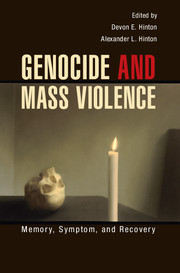Book contents
- Frontmatter
- Contents
- List of Figures
- List of Tables
- List of Contributors
- Foreword: What Does Trauma Do?
- Acknowledgments
- Introduction An Anthropology of the Effects of Genocide and Mass Violence
- Part I Private and Public Memory
- 1 The Vietnam War Traumas
- 2 Haunted by Aceh
- 3 Remembering and Ill Health in Postinvasion Kuwait
- 4 “Behaves Like a Rooster and Cries Like a [Four Eyed] Canine”
- 5 Embodying the Distant Past
- 6 Half Disciplined Chaos
- Part II Symptom and Syndrome
- Part III Response and Recovery
- Index
- References
1 - The Vietnam War Traumas
Published online by Cambridge University Press: 05 November 2014
- Frontmatter
- Contents
- List of Figures
- List of Tables
- List of Contributors
- Foreword: What Does Trauma Do?
- Acknowledgments
- Introduction An Anthropology of the Effects of Genocide and Mass Violence
- Part I Private and Public Memory
- 1 The Vietnam War Traumas
- 2 Haunted by Aceh
- 3 Remembering and Ill Health in Postinvasion Kuwait
- 4 “Behaves Like a Rooster and Cries Like a [Four Eyed] Canine”
- 5 Embodying the Distant Past
- 6 Half Disciplined Chaos
- Part II Symptom and Syndrome
- Part III Response and Recovery
- Index
- References
Summary
Books about the Vietnam War abound with stories of painful personal wounds – the wounds that continue to trouble the bodies and souls of those who experienced the brutal and protracted war long after it was over. This is evidently the case in the memoirs written by former U.S. veterans of the Vietnam War in fictional or biographical form. In Philip Caputo’s moving autobiographical account, The Rumour of War, the war veteran is haunted by the deaths of his fellow soldiers and his Vietnamese acquaintances (Caputo, 1977). He is also troubled by the recurrent memory of an old Vietnamese villager crying out, “Why?” as his thatched house was set on fire by Caputo’s unit. Some of these accounts show that the Vietnam War left deep scars not only in individual bodies but also in the collective body – thus the idea of the Vietnam syndrome, which refers to the Vietnam War’s enduring, haunting effects on the American collective consciousness and its body politic. According to a commentator, “The Vietnam War was traumatic not only for those who fought in it but also for those who were strongly opposed to it” (Neal, 2005, p. 79).
Traumas caused by the Vietnam War are prominent, moreover, not merely in the popular literary world but also in the scientific literature. According to Allan Young (1995), it was after the Vietnam War that the phenomenon we now call posttraumatic stress disorder (PTSD) came to occupy a firm place in social knowledge and institutional practice, particularly in the United States. He proposes that PTSD is in part a social construct born out of the specific postwar historical context. Furthermore, it is a condition that is identified primarily with the lives of American veterans of the Vietnam War, whose combat experience in a foreign war was presumed to constitute the etiological event for postwar posttraumatic symptoms (p. 113).
- Type
- Chapter
- Information
- Genocide and Mass ViolenceMemory, Symptom, and Recovery, pp. 45 - 57Publisher: Cambridge University PressPrint publication year: 2014
References
- 1
- Cited by



